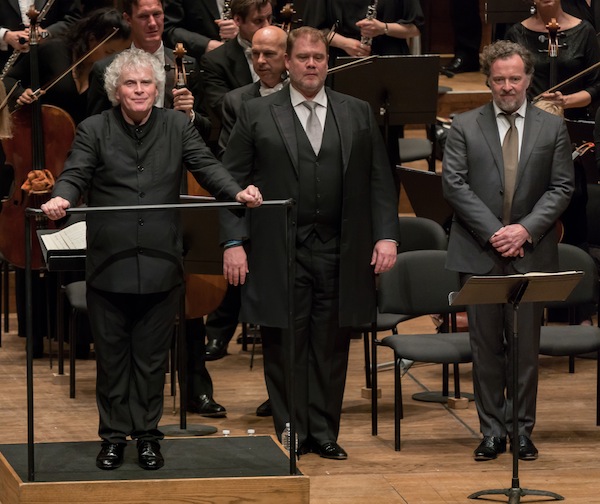Rattle, London Symphony Orchestra guide an emotional journey through Mahler’s “Das Lied”

Simon Rattle and soloists Stuart Skelton and Christian Gerhaher acknowledge applause following the performance of Mahler’s “Das Lied von der Erde” with the London Symphony Orchestra Sunday at David Geffen Hall. Photo: Kevin Yatarola
For the last several decades, Simon Rattle has ranked in the top tier of conductors. His legendary work with a number of orchestras has earned him a reputation as one of the world’s most sought-after podium guests, and in his fifteen years at the helm of the Berlin Philharmonic, they have remained perennial favorites for the title of “world’s greatest orchestra.”
His announcement in 2013 that he would step down from the BPO this year spurred a frenzy in the musical press—one perhaps matched only by his announcement in 2015 that he would return to the UK to lead the London Symphony Orchestra, starting with the 2017-18 season.
This past weekend, Rattle and the LSO made their first trip together to New York, offering audiences of the Lincoln Center Great Performers series a glimpse of what that partnership will look like in the coming years—and they did so on a massive scale, offering three concerts of Mahler’s symphonic works at David Geffen Hall.
The middle program Sunday afternoon consisted only of Das Lied von der Erde, that enormous work of genius that defies classification. In its six movements, the LSO showed they deserve their reputation as a tight and powerful ensemble, following Rattle in a majestic interpretation.
They glittered in the opening flourishes of “Das Trinklied vom Jammer der Erde,” showing a taut sound, and a gleam that verged on harshness in the cold acoustic of David Geffen Hall. Tenor Stuart Skelton, like many Heldentenors, has an unfortunate tendency to push so hard in his top range that he seems to be shouting at the listener. Grating as it was, the aggressive singing fit the manic spirit of the text, and made a sharp contrast with the dark, viscous tone of his middle register. He found deep pathos in his gloomy refrain of “Dunkel ist das Leben, ist der Tod.”
Das Lied on Sunday was performed in the baritone version, rather than with alto. Christian Gerhaher was Skelton’s exact opposite, singing with lightness and clarity, and altogether more nuance. Moving from calm reflection to firm exhortation, he built to tense urgency in the last stanza of “Der Einsame im Herbst.” The LSO were at their most flexible here, executing hairpins and swells with force and precision; from faint whispers to pulsing crests, their dynamic range was remarkable.
Skelton backed off just enough in “Von der Jugend” to show the real shine of his voice without overpowering the merry chirping of the orchestra. Gerhaher gave a masterful reading of “Von der Schönheit,” drawing in the listener with his detailed vocal reading constructing phrases in miniature and articulating every detail. Skelton countered with boisterous abandon in “Der Trunkene im Frühling,” using the humor of the text to underscore the darkness of its drunken subject.
“Der Abschied,” the last movement, makes up half of Das Lied on its own, and outstrips all the other movements in terms of its depth, as well. Gerhaher’s reading was breathtaking in its profound sadness, bringing somber simplicity to his recitation of the first lines over the deep pounding of the orchestra, and conveying keen loss in the penultimate stanza, reflecting the longing in the text that cannot be fulfilled.
As fine as Gerhaher was here, it was Rattle’s direction that made this massive final movement land with such force. The limping sighs of the brass were rich with grief, and the basses captured a deep, primal groaning of the Earth. Rapturous swells accompanied the baritone’s climactic exultation, “O Schönheit! O ewigen Liebens!” Throughout the work, there seemed to be as much poetic meaning in the orchestral playing as in the singing, even when the text fell away.
It takes quite a performance to bear the emotional and philosophical weight of the echoing final word, “Ewig . . . ewig . . . ” (“Forever . . . forever . . . “). One could hardly have asked for better guides to the cerebral journey of Das Lied than Rattle and the LSO.
Simon Rattle and the London Symphony Orchestra will perform Mahler’s Symphony No. 10, in the Deryck Cooke completion 8 p.m. Monday at David Geffen Hall. lcgreatperformers.org





